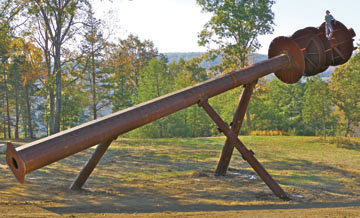Edward Tufte
dal 12/6/2009 al 16/1/2010
Segnalato da
12/6/2009
Edward Tufte
The Aldrich Contemporary Art Museum, Ridgefield
Seeing Around. In the last ten years, the artist has completed fifty large-scale abstract outdoor installation artworks, one hundred table pieces, and numerous steel engravings and digital prints. His sculptures are constructed from stainless steel, weathered and rusting steel, road plate, scrap metal, discards from a nuclear power plant, and blacksmithing and mechanic's tools. For his exhibition Tufte has reconstructed the topography of the Garden to refine the relationships among the pieces, the sun's position, and the local horizon.

The Aldrich Contemporary Art Museum and Edward Tufte—one of the great visual minds of our time, described by The New York Times as "the Leonardo da Vinci of data" and by Business Week as "the Galileo of graphics"—have collaborated on a spectacular new exhibition.
Seeing Around, the first major museum exhibition of the sculpture of Edward Tufte, will be on view from June 13, 2009, to January 17, 2010. The exhibition will take place in The Aldrich's three-acre Sculpture Garden and the adjacent Project Space gallery.
In the last ten years, the artist has completed fifty large-scale abstract outdoor installation artworks, one hundred table pieces, and numerous steel engravings and digital prints. His sculptures are constructed from stainless steel, weathered and rusting steel, road plate, scrap metal, discards from a nuclear power plant, and blacksmithing and mechanic's tools. The complex geometries of the stainless pieces borrow, reflect, alter, and absorb nature's light to create a multiplicity of beautiful color fields. The rusting, weathered artworks produce complex, multiple, and sometimes playful narratives.
Tufte's monumental sculptures—including Larkin's Twig, which stands 32 feet tall, and Rocket Science, which weighs 48,000 lbs—are partly a response to his own well-known books on analytical visual displays of data and information. Two-dimensional space—the flatlands of paper and the computer screen—inherently compresses and makes illusory the reality of the three-dimensional world. In contrast, outdoor sculpture provides endless and complex experiences of space, light, color, and airspace in nature's full reality of three dimensions. Tufte's outdoor artworks reside in the land, the trees, and the air. His essay on sculpture, Seeing Around, accompanies the exhibition.
For his exhibition at The Aldrich, Tufte has reconstructed the topography of the Museum's Sculpture Garden to refine the relationships among the pieces, the sun's position, and the local horizon. His new plantings of white pine, spruce, red cedar, and bamboo shape the garden's space and provide natural backgrounds for the artworks.
Director Harry Philbrick says, "Meeting the challenges of presenting the unusual is the greatest strength of our exhibitions team at The Aldrich. Working with an artist like Edward Tufte to exhibit a facet of his work that is less well known than his celebrated work in two-dimensional, analytical design is exciting for us. We're honored to host this beautiful and thoughtful exhibition. We are also grateful for the long term improvements and enhancements Edward has made to the Museum's Sculpture Garden."
The public are invited to meet the artist at an Exhibition Reception on Sunday, June 21, from 3 to 5 pm. At 4 pm, Edward Tufte will give a brief garden talk about his work on view. Refreshments will be served. Round-trip transportation from New York City is available.
On Saturday, June 20, dancers Eiko and Koma will do a sunset performance in the Sculpture Garden amidst Tufte's large scale work for an Aldrich benefit, the Solstice Garden Party.
On Saturday, July 11, Tufte will teach a short version of his famous course on visual thinking at The Ridgefield Playhouse, followed by an artist's tour of Seeing Around at The Aldrich. This event is a benefit for The Aldrich, Flanders Nature Center and Land Trust, and the Ridgefield Conservation Commission.
On Saturday, August 1, the Museum will host Dogs + Sculpture Day, an afternoon when visitors and their dogs can enjoy the garden together. A visit by a flock of sheep to the sculpture is also planned.
Museum funding provided, in part, by the Connecticut Commission on Culture & Tourism, the National Endowment for the Arts, and the Institute of Museum and Library Services. Special thanks to the opening weekend event sponsors: Collyer Catering, Ridgefield Magazine, HSBC Bank, WSHU Public Radio, and the Harry Zarin Fund.
The Artist: Edward Tufte wrote, designed, and self-published four books on analytical design: The Visual Display of Quantitative Information, Envisioning Information, Visual Explanations, and Beautiful Evidence. The New York Times described Tufte as the "Leonardo da Vinci of data" and Business Week called him the "Galileo of graphics." His artwork has been exhibited at Artists Space and The Drawing Center (New York) and the Architecture+Design Museum (Los Angeles).
The Museum: The Aldrich is one of the few non-collecting contemporary art museums in the United States. Founded on Ridgefield's historic Main Street in 1964, the Museum enjoys the curatorial independence of an alternative space while maintaining the registrarial and art-handling standards of a national institution. Exhibitions feature work by emerging and mid-career artists, and education programs help adults and children to connect to today's world through contemporary art. The Museum is located at 258 Main Street, Ridgefield, CT 06877. All exhibitions and programs are handicapped accessible. Free on-site parking. Regular Museum hours are Tuesday through Sunday, 12 noon to 5 pm. For more information call 203.438.4519.
Image: Edward Tufte, Rocket Science, 2007
Press contact:
Pamela Ruggio Phone: 203.438.4519 Email: pruggio@aldrichart.org
The Aldrich Contemporary Art Museum
258 Main Street Ridgefield, CT 06877
Hours
Tuesday - Sunday, 12 noon to 5 pm



